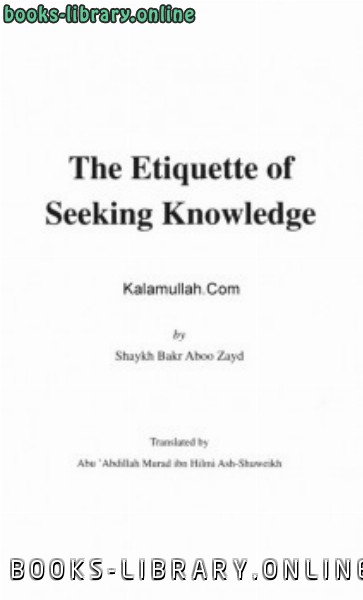📘 قراءة كتاب The Etiquette of Seeking Knowledge أونلاين


Contents
Transliteration Table ...............
.........................
.
.....
.
.......
.............
.
6
The Translator’s Foreword
................
,
.....
...
...................
.
.................
7
The Author’s Foreword .
.....................................
.......
.
............
.
........
14
C hapter 1: The E tiquette o f the S eek er’s Inner S e l f
........
18
1. Knowledge is worship
.
..................................
.
...............................
18
2. Be adherent to the path of the
Salaf as-Saalih
..........21
3. Commit to fearing Allaah, the Most High
.....
.
.......
......
.
23
4. Continual observance [of Allaah]
.....
.
..........
.
...........................
.
25
5. Lower your wing and put arrogance and pride behind you
....
.
25
6. Contentment and
zuhd
(Asceticism)
.......................
....................
27
7. Adorn yourself with the splendour of knowledge
.
.............
.
28
8. Adorn [yourself] with honour
.
.............................
.
............
.
29
9. Enjoy masculine qualities
.
............................
.
........... 29
10. Forsaking lux ury .............
.
....................................... 30
11. To avoid the gatherings of vain speech........
....
.
........... .
33
12. Avoid commotion
(hayshaat)
.
.....
...
.....
.
....................
........
33
13. Adorn [yourself] with gentleness..........
....
.............
.
......
.
33
14. Contemplation
.
......
.....................................
.....
-
.....
-
.....
.
.....
.
34
15. Firmness and confirmation.....
....
.
............ ...........
...........
..........
34
Chapter 2: The M ethodology o f Seeking K n o w led g e....... 35
16. The methodology of seeking knowledge and its levels
............
35
17. To acquire knowledge from the
mashaa 'yikh
(scholars)
.........
40
Chapter 3: The Etiquette o f the Seeker with his
S h aykh
... 44
18. Considering the
shaykh
’.v [consequent] status 44
19. Your capital - O seeker - is from your
shaykh
.....
.
........
.
46
20. The
shaykh
3 enthusiasm in his lessons
.......
...............
.........
.
47
21. Writing what the
shaykh
says during the lesson or revision
....
47
22. Acquiring knowledge from a
muhtadi
’ (an innovator)
.
...
.........
47
C hapter 4: The E tiquette o f C om p an ion sh ip
.
..............
......
58
23. Beware of the bad companion...........
.
..................
.....................58
C hapter 5: The E tiquette o f the Student in
L eading a Life o f K n o w led g e
.
........
.
60
24. High aspirations in knowledge
..............
.
...................... ............
60
25. The burning desire for seeking knowledge .
....
,
.....
.
............... .
61
26. Emigrating for the sake of seeking knowledge
.
............. .
...........62
27. Preserving knowledge through writing [it]
.........
.
............
.
.......
62
28. Preservation (of knowledge) through paying attention to it
....
64
29. Occasional revision of knowledge...........................
................
„ 65
30. To gain understanding (of Islaam) by deriving the issues
oifiqh
(Islaamic rulings) by applying the [comprehensive]
principles (of the
Sharee 'ah)
..............
.
............................
......
65
31. Seeking refuge in Allaah when seeking knowledge
and acquiring it
................
............
........................................
.......
69
32. Honesty in knowledge
.
.........
.
.........................
............... ............
69
33. Truthfulness
....... .
.............. .............. ..........
....................
.
.......
.
70
34. The sanctuary of the seeker of knowledge
...........
.
...............
....72
35. Preserving your capital [i.e. lifetime]
........
...............
............
.
72
36. Relaxing the body
.
................
........
......
.
..............................
........
74
37. Precision and correction reading
.......
.
.............
........
................ 75
38. Summarising long compilations [through reading]
.
.................
76
39. Excellence in asking questions
........................
............
.
.......
..... 76
40. Debating without argumentation
......
....................
.
....................77
41. Revision of the knowledge in groups ...
___
_
______________
77
42. The seeker of knowledge lives between the [texts of the]
Qur'aan and
Sunnah
and knowledge associated to them
.
.........
78
43. Completion of learning the tools of every subject
....
.
..............
78
C hapter 6: A dorn Yourself with the
Im plem entation o f K n o w le d g e
.....................
.....
79
44. The signs of beneficial knowledge
.
.........................
.
.........
.
.......
79
45. The alms of knowledge
.....
.
......................
...............
..80
46. The glory of the scholars...........................
.............. .
................
80
47. Protection of knowledge
.....
.....................................................82
48. Diplomacy not compromise (on behalf of the religion)
.....
.....
83
49. Passion for the books
.
............................ .........................
.
...........
83
50. The foundation of your library
....................
..........................
....
84
51. Dealing with the book
......
.
....................
..........
........
.
.................
85
52. Further to this
.
....................
.
........
.
...........
....................
................85
53. Writing with diacritical points
............
.
..............
.
..........
.
...........
85
C h ap ter?: P recau tions
...........................
.
...............
.
...................
87
54. False hopes
......................
.
...........................
.
........
..........
.
.........
.
87
55. Beware of being “Aboo Shibr” (the father of a span)
.
.............
87
56. Becoming manifest before becoming qualified ...
....
.
........
.
87
57. Deterioration of manners in knowledge
.
................
.
..................
87
58. (Merely) “putting pen to paper”
.....
.
...................
.
...............
88
59. Your stance on the mistakes of those who preceded y o u
....
.
88
60. Deterring dubious affairs
.
..............
.......................................
.......
89
61. Beware of grammatical errors (in Arabic)
.
...................
.............
89
62. Beware of premature intellectuality
.
..........................
...............
90
63. Beware of the new
Israa'eeliyaat
........
........
...........
...................
91
64. Beware of Byzantine debate
.
......................................................
92
65. No
walaa'
and
baraa'
(declaring allegiance
and declaring innocence) should be pledged
over sectarianism and partisanship
.
..............
......
.
............ .
........
92
66. The things that nullify this
hilyah
................
..................
............
9
Translator’s Foreword
All praise is due to Allaah alone; we praise Him, seek His aid and
seek His forgiveness. We seek refuge in Him from the evil of our
inner-selves and the evil of our actions. Whomsoever Allaah guides
no one can misguide and whomsoever Allaah misguides no one can
guide. I bear witness that there is no deity worthy of worship except
Allaah and I bear witness that Muhammad is His slave and messen
ger.
O mankind! Be dutiful to your Lord, Who created you from a
single person and from him He created his wife and from them
both He created m any men and women; and fear A llaah
through whom you demand (your mutual rights), and (do not
cut the relations, of) the wombs (kinship), Surely* Allaah is Ever
an All-Watcher over you.
“O you who believe! Keep your duty to Allaah and fear Him,
and speak always the truth. He will direct you to do righteous
good deeds and will forgive you your sins. And whosoever obeys
Allaah and His m essenger he has indeed achieved a great
achievement
Translator’s Foreword
All praise is due to Allaah alone; we praise Him, seek His aid and
seek His forgiveness. We seek refuge in Him from the evil of our
inner-selves and the evil of our actions. Whomsoever Allaah guides
no one can misguide and whomsoever Allaah misguides no one can
guide. I bear witness that there is no deity worthy of worship except
Allaah and I bear witness that Muhammad is His slave and messen
ger.
“O you who believe! Fear Allaah as He should be feared, and
die not except in a state of Islaam.
“O you who believe! Keep your duty to Allaah and fear Him,
and speak always the truth. He will direct you to do righteous
good deeds and will forgive you your sins. And whosoever obeys
Allaah and His m essenger he has indeed achieved a great
achievement.”
[Soorah al-Ahzaab (33):70-71 ]
To proceed: Today we are generally witnessing an Islaamic awak
ening as we see the Muslims re-uniting with their Islaamic identity
that they had lost for so many years, and the situation is as Allaah
described it by saying:
“O you who believe! Keep your duty to Allaah and fear Him,
and speak always the truth. He will direct you to do righteous
good deeds and will forgive you your sins. And whosoever obeys
Allaah and His m essenger he has indeed achieved a great
achievement.”
[Soorah al-Ahzaab (33):70-71 ]
To proceed: Today we are generally witnessing an Islaamic awak
ening as we see the Muslims re-uniting with their Islaamic identity
that they had lost for so many years, and the situation is as Allaah
described it by saying:
“Is he who is dead and We gave him life and set for him a light
whereby he can walk amongst men; like him who is in the dark
ness never to emerge therefrom?
... to adorn oneself with beautiful etiquette, noble manners, good behaviour, and pious conduct are distinguishing characteristics of the people of Islam, and knowledge the most precious pearl in the crown of the purified Shariah cannot be attained except by those who adorn themselves with its etiquette and those who leave evil qualities associated to it. For this reason the scholars devoted their attention to this etiquette, outlined its importance and wrote books solely on this topic either pertaining to general conduct with all types of knowledge or to specific types of knowledge such as the etiquette of the carriers of the Noble Quran, the etiquette of the muhaddith, the etiquette of the mufti, the etiquette of the qazi judge , the etiquette of the muhtasib the one who enjoins good and forbids evil for the sake of Allah and so on. The issue of this book is the general conduct of those who take the path of seeking the knowledge of the Sharee’ah.
حجم الكتاب عند التحميل : 13.3 ميجا بايت .
نوع الكتاب : pdf.
عداد القراءة:
اذا اعجبك الكتاب فضلاً اضغط على أعجبني و يمكنك تحميله من هنا:

شكرًا لمساهمتكم
شكراً لمساهمتكم معنا في الإرتقاء بمستوى المكتبة ، يمكنكم االتبليغ عن اخطاء او سوء اختيار للكتب وتصنيفها ومحتواها ، أو كتاب يُمنع نشره ، او محمي بحقوق طبع ونشر ، فضلاً قم بالتبليغ عن الكتاب المُخالف:
 قبل تحميل الكتاب ..
قبل تحميل الكتاب ..
يجب ان يتوفر لديكم برنامج تشغيل وقراءة ملفات pdf
يمكن تحميلة من هنا 'http://get.adobe.com/reader/'


 منصّة المكتبة
منصّة المكتبة 